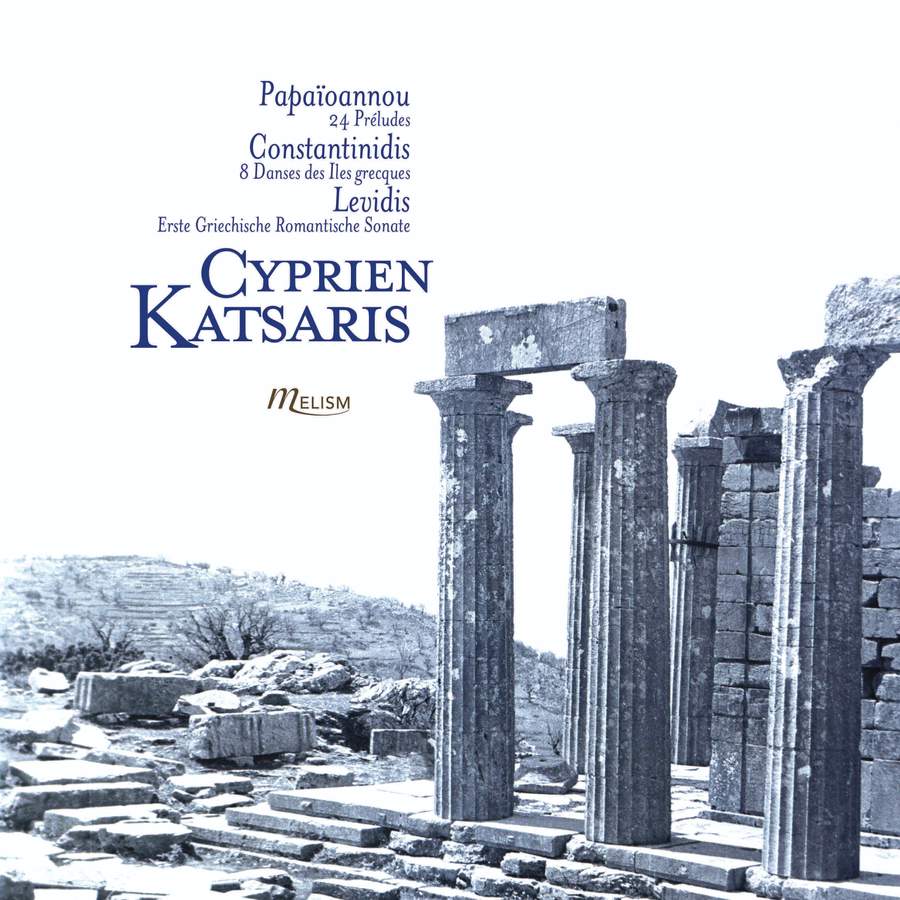PAPAÏOANNOU 24 Préludes pour piano (Cyprien Katsaris)
View record and artist detailsRecord and Artist Details
Genre:
Instrumental
Label: Melism
Magazine Review Date: 11/2022
Media Format: CD or Download
Media Runtime: 61
Mastering:
DDD
Catalogue Number: MLSCD035

Tracks:
| Composition | Artist Credit |
|---|---|
| 24 Preludes |
Yannis Papaïoannou, Composer
Cyprien Katsaris, Piano |
| (8) Dances from the Greek Islands |
Yannis Constantinidis, Composer
Cyprien Katsaris, Piano |
| Griechische Romantische Sonate in einem Teil |
Dimitrios Levidis, Composer
Cyprien Katsaris, Piano |
Author: Ivan Moody
This is the first in what promises to be a series of Greek piano music from Cyprien Katsaris, and very welcome it is. None of the music here is likely to be familiar to anyone but a Greek specialist, and even then much archival work is still required, especially in the cases of Yannis Constantinidis (1903-84) and Dimitrios Levidis (c1885-1951), in order to reach a full understanding of their work and the context in which it was created.
Yannis Andreou Papaïoannou (1910-89) is the best known of these three composers. Not only was he prolific in many genres, he was also an influential teacher. He studied in Paris with Emilios Riadis and Honegger. The 24 Preludes (1938-39) are assuredly Debussian, fluid and thoroughly impressionistically idiomatic. Nevertheless, there are chromatic harmonic colourings that are undeniably Greek (Prelude No 5, ‘Clair de lune’, for example), and even, in the very brief No 15, a quotation of Christos anesti, the Byzantine paschal hymn. In such preludes as No 18, ‘L’amazone’, or No 22, ‘La neige’, he shows astounding descriptive powers, conjuring up an image in less than a minute of music; these are works that could certainly not be confused with Debussy, even if his technical influence may underlie them.
Constantinidis’s Eight Greek Dances (1954) are quite different. The composer was part of that intriguing and tragic generation that grew up in Smyrna, where he was surrounded by a very French culture. He was able to leave Smyrna, was imprisoned briefly in Constantinople and then made his way to Germany, where he joined Skalkottas, who was working as a orchestral violinist, and made his living writing operettas and film scores. These dances are snapshots of his heritage, stylisations of dances he would have known or heard from his childhood, some of them quite exotic, such as the ‘Zervodeigos roditikos’ (Andantino mosso, track 28), or Con moto, ‘To Thalassaki’, an evocation of the Kalymnian sea, using the traditional complex metrical system with tremendous panache (track 29).
The Levidis Sonata is in many ways the most intriguing piece on this recording. The composer studied in Switzerland and Germany, spent time working in Paris and became famous for his Symphonic Poem for ondes martenot – not ‘Martenot Waves’ as the booklet note has it – and orchestra (1929). The Sonata is fascinating because of its German ancestry. This trajectory is strongly reminiscent of that of the Portuguese José Vianna da Motta, and shows, in spite of its brevity, one direction in which Greek music might have gone. Katsaris is master of both French and German styles and, more importantly, of the Hellenic impulse underlying both of them. An outstanding release, very well recorded.
Discover the world's largest classical music catalogue with Presto Music.

Gramophone Digital Club
- Digital Edition
- Digital Archive
- Reviews Database
- Full website access
From £8.75 / month
Subscribe
Gramophone Full Club
- Print Edition
- Digital Edition
- Digital Archive
- Reviews Database
- Full website access
From £11.00 / month
Subscribe
If you are a library, university or other organisation that would be interested in an institutional subscription to Gramophone please click here for further information.




